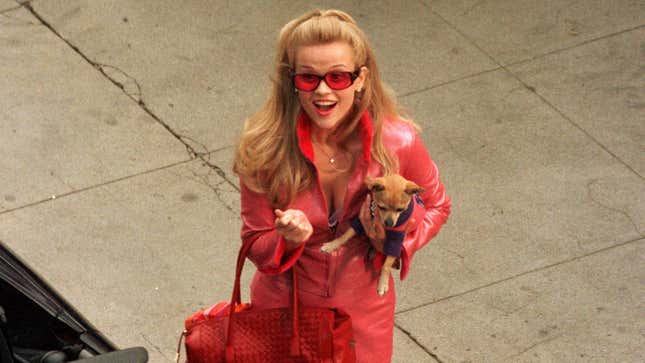The Only Feminist Movie Ever Made Turns 20 This Year
“If you’re going to let one stupid prick ruin your life,” then you need to rewatch Legally Blonde
EntertainmentMovies

Every morning before I crawl over to the chains that connect me to the blogging machine for several hours a day, I meditate on a specific scene from the film Legally Blonde which motivates me through my entire day. It is an incredibly transformative moment where the film’s protagonist, Elle Woods, bumps into her ex-boyfriend Warner Huntington III, who asks, “You? Got into Harvard Law?” Elle, played by Reese Witherspoon, then delivers the greatest line read in all of cinematic history by replying, “What, like it’s hard?” If there is a scene more influential than that, it has yet to cross my field of vision.
Twenty years ago, on an unassuming July 13, the world was introduced to Elle Woods, and I dare say that it has never been the same. Of course, I don’t actually remember that specific day because I was nine years old and my mom wasn’t dragging me to a theater to watch a PG-13 comedy—but when I finally saw it, I too was changed.
Legally Blonde follows sorority girl Elle Woods who literally has it all. Her family is wealthy, she has a 4.0 GPA in fashion merchandising, she’s chapter president of Delta Nu, and she’s got a hot white boyfriend who is also wealthy. Within minutes, though, Elle’s life is ripped to shreds as Warner dumps her, claiming that if he ever wants to become a senator like his forebearers, he needs to find his Jackie Onassis and can’t marry a Marilyn Monroe. Crushed but not broken, Elle devises a scheme to show Warner that she can be both and gets herself into Harvard Law, the same school Warner is attending with his new fiancé Vivian Kensington. Undeterred by this minor setback, Elle commits to law school and finds her groove just in time to kick Warner to the curb and win her first trial, all while never compromising who she truly is: a woman who fucking loves to wear pink.
-

-

-

-

-

-

-

-

-

-

-

-

-

-

-

-

-

-

-

-

-

-

-

-

-

-

-

-

-

-

-

-

-

-

-

-

-

-

-

-








































